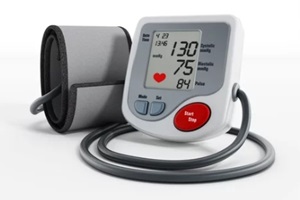 You may have heard that stress can result in your blood pressure spiking temporarily. But can it contribute to developing chronic high blood pressure over time? The connections between stress levels and high blood pressure are complex, and research is still ongoing in this area.
You may have heard that stress can result in your blood pressure spiking temporarily. But can it contribute to developing chronic high blood pressure over time? The connections between stress levels and high blood pressure are complex, and research is still ongoing in this area.
However, some clear connections exist, and managing stress is important for heart health.
What Happens During the Stress Response?
Your body has an inbuilt stress response to help you react to threatening situations. This response leads your heart to beat faster and breathing quicken when faced with a tough work deadline or a dangerous scenario.
Biological changes also occur behind the scenes. Stress hormones such as cortisol and adrenaline flood into your bloodstream, rousing the body into crisis mode so you’re prepared for “fight-or-flight.”
In the immediate term, these reactions are helpful. However, one-way adrenaline and cortisol ready your body is by narrowing blood vessels and spurring your heart to pump faster. This response leads your blood pressure to rise for a while.
Most people’s readings return to normal once the immediate stress passes. However, frequent or prolonged activation of the stress system may cause situational spikes that damage blood vessels or lead to unhealthy behaviors.
Acute Stress Vs. Chronic Stress
Scientists categorize stress into acute and chronic. Acute stress comes from a sudden negative event that swiftly activates your body’s alert systems, such as nearly missing a car accident or learning of a loved one’s hospitalization.
As soon as the trigger is gone, your biological processes usually revert to standard levels. Chronic stress is felt as a lingering sense of tension, feeling overwhelmed, or anxiety.
It might come from long-term difficulties such as a toxic work culture, financial troubles, or marital conflict.
Experts believe recurring acute stress episodes can morph into chronic stress when someone feels as if they have minimal control over problems or inadequate support.
There are indications chronic stress sustains slightly higher baseline levels of stress hormones and other biological markers.
Stress and Hypertension Risk
Several analyses reveal an association between high stress and an increased prevalence of hypertension. However, many specialists believe chronic stress serves as an indirect risk factor.
Rather than independently causing sustained blood pressure elevation, chronic stress can lead to other intermediate risk factors such as:
 Poor sleep quality
Poor sleep quality- Overeating and weight gain
- Increased alcohol consumption
- Smoking or vaping
Additionally, if stress and distress lead to anxiety disorders or clinical depression, you may forget to take prescribed blood pressure medications regularly. Symptoms such as low motivation and feelings of hopelessness interfere with making heart-healthy lifestyle adjustments.
That said, a subset of patients do appear sensitive to stress-related blood pressure spikes — particularly those with repeated or exaggerated acute episodes. These short-term rises likely inflict gradual vascular damage that adds up over decades.
Managing Stress Effectively
Because of the connections mentioned above, getting stress levels under better control can benefit your blood pressure and overall well-being. Some strategies you can try include:
Prioritizing Adequate Sleep
When you sacrifice sleep to pack more into your schedule, stress typically follows. Resetting your sleep schedule to get 7-9 hours nightly helps you approach challenges more calmly. Turn devices off early, establish soothing bedtime rituals such as reading or meditating, and wake up and go to bed at consistent times.
Learning Key Relaxation Skills
Giving yourself permission to consciously unwind is essential for resilience. Yoga, deep breathing, short guided meditations via an app, and progressive muscle relaxation provide easily accessible ways to initiate your relaxation response. Start with 5-10 minutes daily.
Growing Your Support Network
Feeling connected to close confidantes allows you to voice frustrations and feel heard, which are essential to relieving stress. Nurture intimacy with your partner, lean on trusted friends or family when possible, and make cultivating relationships an intentional goal.
Improving Time Management Abilities
Take time to honestly assess your schedule and planning skills if days feel like a race to complete a million tasks. Overcommitment stems from trouble accurately judging your workload capacity and poor organization.
Boost productivity by blocking off calendar time for essential priorities first, then saying “no” to non-essentials that cause strain.
Attempting To Resolve Stressors When You Can
Swirling thoughts about complex problems that feel out of your control amplify perceived stress. While many modern challenges have no quick fixes, some personal, familial, or occupational stressors can be actively worked through via conflict resolution approaches.
Scheduling Pleasant Activities
 When demands start overwhelming you, leisurely pursuits are often the first things you cut from your packed routine.
When demands start overwhelming you, leisurely pursuits are often the first things you cut from your packed routine.
However, engaging in activities that simply make you feel good is key for mental health and modifying elevated stress hormone levels. So, make relaxation, joy, and meaning a priority, not just a bonus for those rare free moments.
Reduce High Blood Pressure Risk by Reducing Stress with Help from Imperial Center Family Medicine
Clearly, there are certain connections between high stress and a greater risk of developing high blood pressure. While the exact mechanisms continue to be researched, managing tension through lifestyle approaches positively impacts your overall wellness and heart health.
When you feel overwhelmed by stressors and don’t know what to do, turn to Imperial Center Family Medicine. Our team has extensive experience helping patients holistically lower blood pressure risks, including by tackling excessive stress.
Contact us today at 919-873-4437 or online so we can work together on an integrated plan for you.
